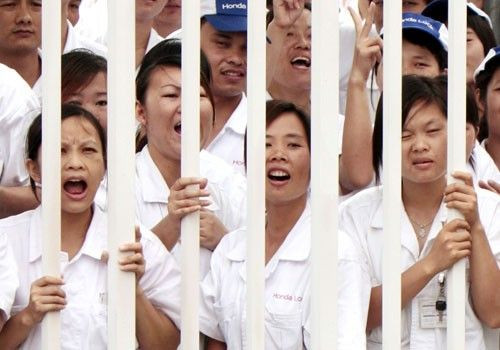Chinese Workers Strike After Japanese Exec's Controversial Comments

Hundreds of workers at a factory in the southern Chinese city of Dongguan erupted in protest after a Japanese executive made remarks about the Japanese occupation in China that offended employees.
Masataka Kataoka, chairman of Alps Electric, reportedly told managers that Japan’s occupation in China during World War II was not an invasion, but rather to liberate the country from colonial powers. Kataoka’s comments were then repeated by a staff member while on a call with Dongguan Changan Rihua Electronics Plant, a joint venture of Alps Electric.
According to local newspaper Southern Metropolis Daily, as many as 1,000 uniformed workers went on strike, gathering outside the entrance of the Alps factory. According to the Tokyo-based spokesman, Takashi Sogo, the Alps head office was monitoring the situation through Japanese employees on site. According to the newspaper, Kataoka was “meeting with factory workers” and eventually made a public apology to the workers.
The story, which was shared on social media, roused heated discussion from Chinese bloggers, who stirred up a controversy about China and Japan’s violent history and about the nations' present-day maritime disputes.
“Chinese workers with backbones, good job,” one blogger wrote. “I am not against Japanese people. I am against their attitude toward history.”
Others blamed Japan’s government, and the adoption of what many call “revisionist” history books that don’t accurately describe the atrocities that took place in China during World War II, in particular the Nanking Massacre of 1937. “It is ridiculous to me that someone can be an executive at a company and still be so unaware of history,” one blogger wrote.
“We have our problems with censorship [here in China] but the way they teach their history, it’s a joke that Japan is not criticized,” another added.
“By what definition is killing hundreds of thousands of people ‘liberating’ a country? It’s not only wrong, it’s disrespectful.”
China and Japan’s history continues to be a source of contention in both nations. Japanese leaders continue to upset China when they visit the controversial Yasukuni shrine, which honors hundreds of convicted war criminals, many of whom were responsible for mass killings of Chinese people. Sino-Japanese relations have only devolved as Tokyo and Beijing continue to spar over the resource-rich Senkaku/Diaoyu islands in the East China Sea.
© Copyright IBTimes 2024. All rights reserved.






















